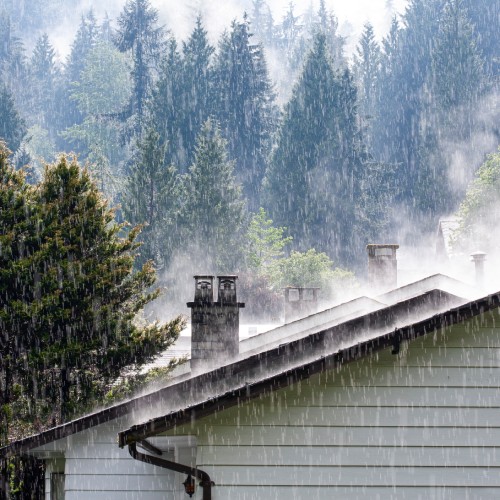While a rainy day might seem cozy when you’re sitting in a warm living room, excessive rain can wreak havoc on your plumbing system. Measures such as installing proper drainage and inspecting vulnerable areas after storms can prevent potential damage. Learn how heavy rainfall affects your home’s plumbing so that you can take preventative measures and recognize when problems start to form.
Overwhelms Your Drainage Systems
Residential drainage systems include gutters, downspouts, and drainage pipes. When the volume of rain overwhelms these systems, it can create clogs that impede water flow, leading to leaks or backups.
Additionally, when gutters and downspouts get clogged, rainwater has nowhere to go but over the edges, seeping into the ground and potentially damaging the building’s foundation. That’s why one of the biggest tips for maintaining your house is to keep the gutters clean and free of debris. Regular cleaning helps ensure your gutters and downspouts work smoothly.
Strains Sump Pumps
Heavy rainfall can put a strain on your home’s sump pumps, an important part of the plumbing system in homes with basements. Sump pumps remove excess water that accumulates in a sump basin to prevent flooding. An intense water influx forces these devices to work harder than usual, potentially leading to mechanical failures.
Heavy rainfall can result in more frequent sump pump cycles, further intensifying wear and tear on the unit. You or a professional plumber or service provider should remove debris and clogs at least once a year, preferably before the rainy season or periods of heavy precipitation.
Causes Sewer Line Issues
Intense rainfall can inundate sewer systems, leading to sewage backups in homes if the plumbing cannot handle the volume. When sewer lines become overloaded, the excess pressure can force sewage back through household drains, causing unpleasant and hazardous conditions. The resulting mess can be both costly and time-consuming to clean up.
Regular inspection and maintenance of your sewer lines can help identify and fix potential issues before they escalate. Consider installing a backwater valve, which can prevent sewage from flowing back into your home. Keep in mind that warmer weather often causes more rain, and sewer backups from storms are one of the more common plumbing problems caused by warm weather. Sewer line cleaning can reduce the risk of sewer backups from storms.
Understanding how heavy rainfall affects your home’s plumbing can help you take proactive steps to safeguard your property. From maintaining your drainage systems to ensuring your basement and foundation are protected, there are several strategies you can employ to mitigate the risks. By staying vigilant and investing in necessary precautions, you can keep your home safe and dry, no matter the weather.
To protect your home’s plumbing, maintain your drainage systems, sump pumps, and sewer lines regularly. Overwhelmed gutters and downspouts can lead to foundation damage, while overworked sump pumps may fail and cause flooding. Sewer line backups are another serious concern, potentially leading to hazardous conditions indoors. Inspect these systems and quickly fix problems that arise to safeguard your home against damage.

